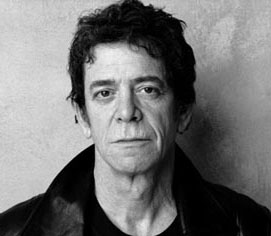It has been almost a week now. I still get sad at random
moments during the day.
After seeing the deaths of many young or middle-aged people
when I was a kid, I remember telling myself that I won’t get upset if a person
lived a life full of bitter/sweet memories and died at a reasonably old age
(like at least 70) because she/he lived a good life, there are people dying at
much younger ages, and we are all going to die anyways.
But I am still upset even though he was 71. Because I feel
like superman died. He was a very nontraditional superman but he was my
superman. I thought maybe I can feel better if I write as I always do.
Even though I had heard his name before, what really
introduced me to Lou Reed was reading Trainspotting in high school. Trainspotting
gave me a good list of musicians to be discovered; Lou Reed, Iggy Pop, etc.,
and shaped some branches of my music taste. From that list, Lou Reed was the
one who left the biggest impression on me, because he not only became one of my
favorite musicians, but also one of my favorite poets and storytellers. His
love for literature was all over his work and he offered me a goldmine for
underground literature in addition to his music and poetry.
He was one of the most important figures in my life who made
me love and respect people as they are, especially the ones marginalized by the
society, because he often wrote about drug addicts, transvestites, prostitutes,
etc. But more importantly, many times he made me accept who I am whenever I
felt like an outcast and hated myself for it.
He was one of the main reasons that during my bachelor’s my
first academic paper’s topic was prostitutes
or I visited a penitentiary regularly to voluntarily work with female prisoners.
He was sometimes a substitute for my mom and dad at nights I had hard time to go to sleep. When I was lying in bed alone in my 19m2 studio
in Lausanne last September with a high fever on a Saturday night, his voice put me to sleep making me dream about a beautiful Sunday Morning.
To a girl like me who gets extremely bored while listening
to famous love songs like Unchained Melody or I Will Always Love You,
he gave her favorite love song, I’m Sticking With You.
He gave me some of my favorite movie scenes; like when Perfect Day plays in Trainspotting or when
Venus in Furs plays in Last Days.
I often felt drunk or high by just listening to some of his
songs.
He was always there to say
everything is going to be alright in various ways when I was broken.
And he will always be there with his songs whenever and wherever I need him.
But it still feels like superman died.



